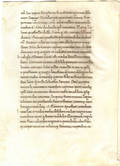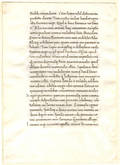University of South Carolina Leaf 39
This leaf comes from a rare manuscript of Livy's History of Rome (completed in about 9 A.D.) copied in Italy in the middle of the fifteenth century. It measures 22.5 x 16 cm and its vellum is very well prepared, though some rubbing of the ink has cast a shadow over the text block of some pages. The Humanistic script is crisp, clear, and without adornment; an exception is the Denison leaf, with its striking initial "H." See Denison University Leaf 39 for more information about this manuscript.
Text: This leaf contains the text of Livy's History, Book 26, Chapters 49-50. The English translation is that of Cyrus Edmonds (1850), via Project Gutenberg.
 South Carolina Leaf 39 Recto
South Carolina Leaf 39 Recto
University of South Carolina Leaf 39 Recto
 South Carolina Leaf 39 Recto Transcription
South Carolina Leaf 39 Recto Transcription
ad sexaginta captos scripserim, si auctorem Graecum sequar Silenum; si ualerium Antiatem, maior scorpionumsex milia, minorum tredecim milia; adeo nullus mentiendi modus est. Ne de ducibus quidem conuenit. Plerique Laelium praefuisse classi, sunt qui M. Iulium Silanum dicant; Arinen praefuisse Punico praesidio deditumque Romanis Antias ualerius, Magonem alii scriptores tradunt. Non de numero nauium captarum, non de pondere auri atque argenti et redacta pecunia conuenit; si aliquis adsentiri necesse est, media simillima ueri sunt. Ceterum, uocatis obsidibus primum uniuersos bonum animum habere iussit: uenisse enim eos in populi Romani potestatem, qui beneficio quam metu obligare homines malit exterasque gentes fide ac societate iunctas habere quam tristi subiectas seruitio. Deinde acceptis nominibus ciuitatium recensuit captiuos quot cuiusque populi essent, et nuntios domum misit ut ad suos quisque recipiendos ueniret. Si quarum forte ciuitatium legati aderant, eis praesentibus suos restituit: ceterorum curam benigne tuendorum C. Flaminio quaestori attribuit. Inter haec e media turba obsidum mulier magno natu, Mandonii uxor, qui frater Indibilis Ilergetum reguli erant, flens ad pedes imperatoris procubuit obtestarique coepit ut curam cultumque feminarum impensius cu-
 South Carolina Leaf 39 Recto Translation
South Carolina Leaf 39 Recto Translation
...at sixty, if I had followed the Greek author, Silenus, if Valerius Antius, of the larger at six thousand, of the smaller at thirteen, so great is the extent of falsehood. Nor are they agreed even respecting the commanders, most say that Laelius commanded the fleet, but some say Marcus Junius Silanus. Valerius Antius says, that Arines commanded the Punic garrison, and was given up to the Romans; other writers say it was Mago. They are not agreed respecting the number of the ships taken, respecting the weight of gold and silver, and of the money brought into the public treasury. If we must assent to some of their statements, the medium is nearest to the truth. However, Scipio having summoned the hostages, first bid them all keep up their spirits observing, "that they had fallen into the hands of the Roman people, who chose to bind men to them by benefits rather than by fear, and keep foreign nations attached to them by honour and friendship, rather than subject them to a gloomy servitude." Then receiving the names of the states to which they belonged, he took an account of the captives, distinguishing the number belonging to each people, and sent messengers to their homes, to desire that they would come and take back their respective friends. If ambassadors from any of the states happened to be present, he delivered their countrymen to them in person, and assigned to them the quaestor, Caius Flaminius, the charge of kindly taking care of the rest. Meanwhile, there advanced from the midst of the crowd of hostages a woman in years, the wife of Mandonius, who was the brother of Indibilis, the chieftain of the Illergetians; she threw herself weeping at the general's feet, and began to implore him to give particularly strict injunctions to their guardians with respect to the care and treatment of females.
 South Carolina Leaf 39 Verso
South Carolina Leaf 39 Verso
University of South Carolina Leaf 39 Verso
 South Carolina Leaf 39 Verso Transcription
South Carolina Leaf 39 Verso Transcription
-stodibus commendaret. Cum Scipio nihil defuturum iis profecto diceret, tum rursus mulier: "Haud magni ista facimus" inquit; "quid enim huic fortunae non satis est? Alia me cura aetatem harum intuentem nam ipsa iam extra periculum iniuriae muliebris sum stimulat." Et aetate et forma florentes circa eam Indibilis filiae erant aliaeque nobilitate pari, quae omnes eam pro parente colebant. Tum Scipio: "Meae populique Romani disciplinae causae facerem" inquit, "ne quid quod sanctum usquam esset apud nos uiolaretur: nunc ut id curem impensius, uestra quoque uirtus dignitasque facit quae ne in malis quidem oblitae decoris matronalis estis". Spectatae deinde integritatis uiro tradidit eas tuerique haud secus uerecunde ac modeste quam hospitum coniuges ac matres iussit. [50.] Captiua deinde a militibus adducitur ad eum adulta uirgo, adeo eximia forma ut quacumque incedebat conuerteret omnium oculos. Scipio percontatus patriam parentesque, inter cetera accepit desponsam eam principi Celtiberorum: adulescenti Allucio nomen erat. Extemplo igitur parentibus sponsoque ab domo accitis, cum interim audiret deperire eum sponsae amore, ubi primum uenit, accuratiore eum sermone quam parentes adloquitur. "Iuuenis", inquit, "iuuenem appello, quo minor sit inter nos
 South Carolina Leaf 39 Verso Translation
South Carolina Leaf 39 Verso Translation
Scipio replied, that nothing certainly should be wanting; when the woman rejoined: "We do not much value such things, for what is not good enough for such a condition? A care of a different kind disquiets me, when beholding the age of these females; for I am myself no longer exposed to the danger peculiar to females." Around her stood the daughters of Indibilis, in the bloom of youth and beauty, with others of equal rank, all of whom looked up to her as a parent. Scipio then said: "Out of regard for that discipline which I myself and the Roman nation maintain, I should take care that nothing, which is any where held sacred, should be violated among us. In the present case, your virtue and your rank cause me to observe it more strictly; for not even in the midst of misfortunes have you forgotten the delicacy becoming matrons." He then delivered them over to a man of tried virtue, ordering him to treat them with no less respect and modesty than the wives and mothers of guests. [50.] The soldiers then brought to him a female captive, a grown-up virgin, of such exquisite beauty, that whichever way she walked she attracted the eyes of every body. Scipio, on making inquiries as to her country and parentage, heard, among other particulars, that she was betrothed to a young prince of the Celtiberians, named Allucius. He immediately, therefore, summoned from their abode her parents and lover, and having heard in the mean time that the latter was desperately enamoured of her, as soon as he arrived he addressed him in a more studied manner than her parents. "A young man myself," said he, "I address myself to a young man, and therefore there need be the less reserve in this conversation...."